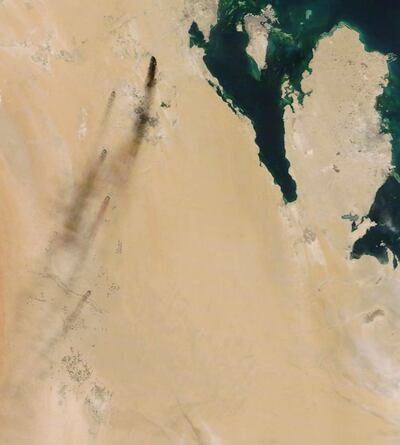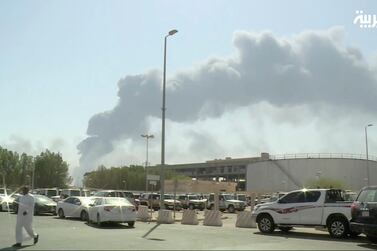Saudi Arabia is racing to restart operations at a major oil plant after attacks at the weekend cut the production of the world’s largest crude exporter by almost half.
Saudi Aramco said the production of 5.7 million barrels of crude a day had been suspended after drone attacks on the world’s largest oil processing plant at Abqaiq – near Dammam in the Eastern Province – and the country’s second-largest oilfield at Khurais, about 200 kilometres away.
The strikes, which happened about 4am, caused large fires but there were no reports of casualties.
Saudi Crown Prince Mohammed bin Salman said the kingdom was "willing and able" to respond to this "terrorist aggression".

The attack was condemned by Palestinian President Mahmoud Abbas, who spoke with Prince Mohammed on Sunday.
Mr Abbas "affirmed his and the Palestinian people’s stand in full solidarity" with the kingdom "in the fight against this terrorism", a statement by the Wafa news agency said.
Late on Saturday, US President Donald Trump called Prince Mohammed to reaffirm his country's "readiness to co-operate with the kingdom by all means to maintain its security and stability", the Saudi Press Agency reported.
Amin Nasser, Aramco’s president and chief executive, said: “Work is under way to restore production and a progress update will be provided in around 48 hours."
Aramco is working to compensate clients for some of the shortfall from its reserves.
The company, which pumped about 9.8 million barrels a day in August, will be able to keep customers supplied for several weeks by drawing on a global storage network.
The Saudis hold millions of barrels in tanks in the kingdom, and in Rotterdam in the Netherlands, Okinawa in Japan, and Sidi Kerir on the Mediterranean coast of Egypt.
Although Yemen's Iran-backed Houthi rebels claimed the attack, US Secretary of State Mike Pompeo said there was "no evidence" that Saturday’s attacks had come from Yemen.
“Tehran is behind nearly 100 attacks on Saudi Arabia while [President Hassan] Rouhani and [Foreign Minister Javad] Zarif pretend to engage in diplomacy,” Mr Pompeo said on Twitter.
“Amid all the calls for de-escalation, Iran has now launched an unprecedented attack on the world’s energy supply.”
Iran denied its involvement, with Foreign Ministry spokesman Abbas Mousavi saying: "Such fruitless and blind accusations and remarks are incomprehensible and meaningless."
Mr Mousavi said that Mr Pompeo's remarks were designed to damage Iran's reputation and provide a pretext for "future actions" against Tehran.
US officials earlier concluded that a drone attack on May 14 on Saudi Arabia’s important East-West pipeline was launched from Iraq, not Yemen. Iraq is home to several Iran-backed militias.
The office of Iraqi Prime Minister Adel Abdul Mahdi denied that the attack was launched from the country.
Saudi Arabia is set to reopen its border crossing with Iraq for trade next month, nearly 30 years after it was closed.
A spokesman for the Houthi rebels, Yahia Sarie, said the attacks involved 10 drones and further strikes were to be expected.
An Arab Coalition led by Saudi Arabia backs the Yemeni government against the Houthis in a civil war that began in 2015. The rebels have been using drones in combat since the start of the war.





